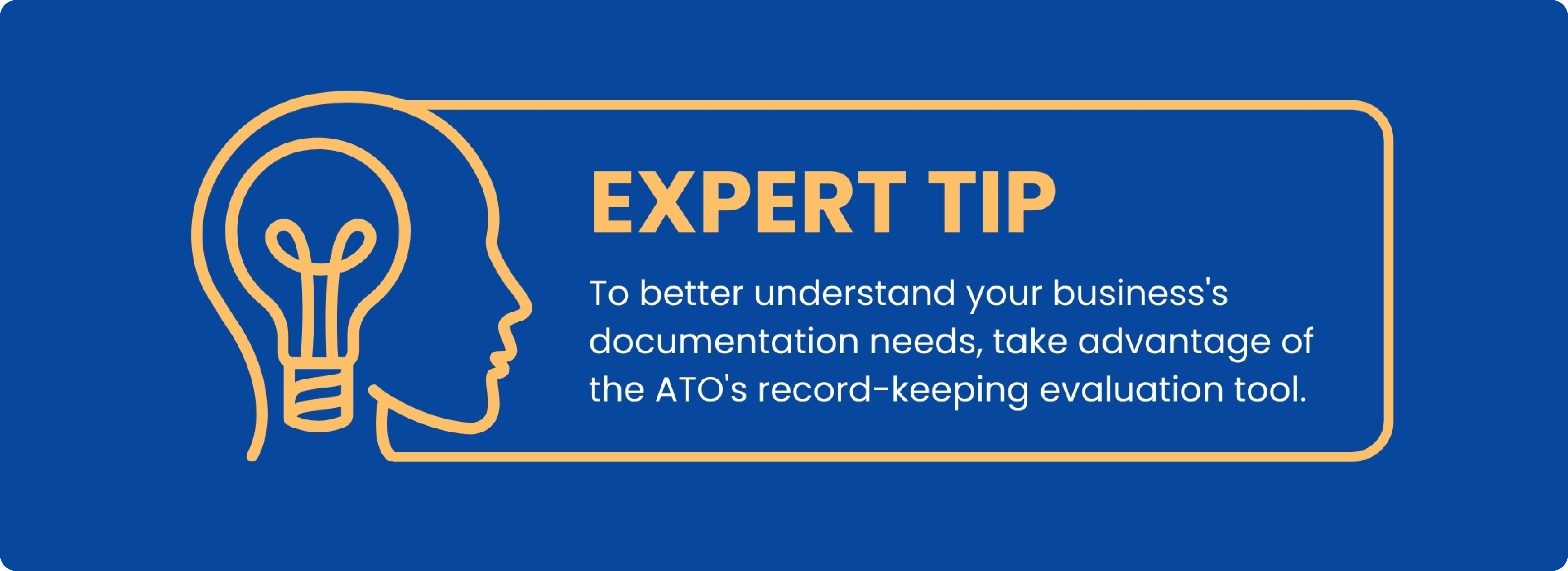How long should you keep your financial records?
Introduction:
Many small businesses are uncertain about how long they should retain their financial records, often overwhelmed by the volume of paperwork or the disorganization of digital documents.
Understanding how long you should keep business records will help you avoid these problems, turning a potential headache into a streamlined process that supports your business's growth and compliance. With the right approach, you can ensure that your record-keeping practices are about staying out of trouble with tax authorities and empowering your business decisions.
This blog is written to clarify the critical aspects of financial record-keeping in Australia. It offers straightforward advice on the necessary records to maintain, the tools to help streamline this process and the advisable length of time for their retention. So, read on for insights that will simplify your approach to record management.
Key takeaways
Record keeping refers to logging, storing, and disposing of crucial financial information for a business.
The Australian Taxation Office (ATO) recommends keeping records digitally or manually.
Essential records for small businesses include detailed invoices, bank statements, and more.
Good record-keeping is crucial for making informed decisions, staying compliant, and efficiently managing finances.
What is record keeping?
Record keeping refers to the process of logging, storing, and disposing of crucial financial information for a business. To properly document most expenses, it's essential to obtain a receipt or a comparable document from the vendor. An adequate record should comprehensively include the following:
- The supplier's name or the name of their business.
- The total cost of the expense or the value of the asset.
- A description of the purchased goods or services.
- The date on which the goods or services were purchased.
- The issuance date of the document itself.
How to maintain your financial records?
The Australian Taxation Office (ATO) recommends the following ways to keep your records organised and up to standards:
- You can keep your records in two ways: digitally or manually.
- If you make copies, they must accurately reflect the original.
- Records must be in English or quickly translated to English if the expense occurred in Australia. For expenses outside Australia, the original language is acceptable.
Not sure which record-keeping method fits your business?
Records small businesses need to maintain
To run your small business smoothly and stay compliant, here are the key records you need to keep:
- Capture every sale and purchase with detailed invoices and receipts to monitor cash flow accurately.
- Regularly update and retain bank statements, balance sheets, and profit & loss statements for a clear financial overview.
- Save all tax-related documents, including annual returns and GST/BAS statements, to ensure compliance and facilitate audits.
- Document all employee salaries, tax withholdings, and superannuation contributions to meet employment law requirements.
- Keep a log of business assets, including purchase dates, values, and depreciation schedules, to manage investments effectively.
- Maintain up-to-date records of stock levels and values for accurate inventory management and sales forecasting.
- Store contracts and agreements related to business financing and property leasing for reference and financial planning.
- Collect and file all expense receipts to track spending, budget accurately, and substantiate tax deductions.

How long do you keep your business financial records?
You might’ve thought you only need to keep your business or tax documents for five years, but in Australia, the actual requirements can vary based on several factors.
While the general rule is indeed to maintain these records for five years from the date you lodge your tax return, there are specific circumstances where it's necessary to keep them for more than 5 years.
This extended period is remarkably advisable to cover various contingencies and ensure full compliance with all regulatory requirements. The period for keeping records in the following situations is:
- Depreciating assets: Keep records for five years after your last claim for deductions on assets that lose value over time.
- Capital gains tax (CGT) assets: Retain records for five years following the confirmation that no more CGT events will happen, applicable to both buying and selling these assets.
- Disputes with the ATO: If you have a dispute with the ATO, hold onto the relevant records for five years after either filing your tax return or resolving the dispute, whichever is later.
- Fringe Benefits Tax Records: Retain for five years following the submission of the Fringe Benefits Tax return.
- Superannuation Contributions Records: Retain for five years from the date each contribution is made.
- Superannuation Fund Selection Records: Maintain for five years from the date of an employee's commencement or from the date they select or modify their superannuation fund choice.
Financial records businesses need to keep for more than 5 years
In specific situations, businesses need to keep records for more than the standard five-year retention period. These include:
- Records connected to an amended assessment: If your tax return or any document is corrected or amended, you need to keep the related records for the period of review (also known as the amendment period). This period varies depending on the type of return but generally ranges from two to four years from the day after the notice of assessment or amended assessment is given.
- Records of information used again in a future return: If you use information from a record in one tax return and then again in a future return, you must keep that record until the period of review for the later tax return ends. This is applicable, for example, when spreading borrowing expenses over five years or carrying forward a business loss to a later year.
- Records of depreciating assets: For depreciating assets, you generally need to keep records for as long as you have the asset, plus another five years after you sell or dispose of it. Different rules may apply if the asset is in a low-value pool or subject to rollover relief.
- Records of capital gains tax (CGT) assets: Similar to depreciating assets, for CGT assets, you need to keep records for the duration you own the asset and then for an additional five years after selling or disposing of it.
- Petroleum resource rent tax (PRRT) records: PRRT records must be kept for at least seven years.

Why is good record-keeping essential for business?
Information is a primary organisational asset that is needed now and into the future. It serves as the foundation upon which businesses build their strategies, make informed decisions, and navigate the complexities of the modern market. Here's how good record-keeping plays a pivotal role in leveraging this asset for sustained growth and resilience:
- Accurate records lead to smarter decisions and help your business grow.
- Proper records keep you on the right side of the law and away from fines.
- Well-kept records mean you can find what you need quickly, boosting your efficiency.
- Good records give you a real look at your finances, helping with smart budgeting.
- Organised records make audits easy and stress-free.
- Keeping accurate records ensures you're doing things right and protects you legally.
- Previous records help you see trends and opportunities for what to do next.
- Accurate and complete records ensure the reliability of business data and build trust among stakeholders.
- Keeping track of records helps you see where you can save money.
- Good records mean you can get back on your feet quickly after a setback.
Good record-keeping strategy for small businesses
The push from the ATO for businesses to move towards digital record-keeping marks a significant shift in how companies manage their finances. In this digital era, the transition to online systems is not just recommended but becoming essential for growth.
As your business expands, the simplicity of digital record-keeping becomes clear, especially when old ways just don't cut it anymore. This is when it's key to start using up-to-date accounting software and online storage options.
Tools like Quickbooks and Xero are leading the way in this digital change, providing strong options for businesses looking for better efficiency and safety in managing their records.
These platforms are easy to use, making it simple for anyone to switch to digital, even without a lot of bookkeeping experience. They help you easily turn all your financial documents into digital files, making them easy to access for reports. Going digital, whether on your own or with an expert's help, makes keeping records easier and safer.
Wrap up
We understand that keeping your financial records organized and up-to-date is crucial for the health and growth of your business. However, we also know it's not always as simple to get on top of your records and bookkeeping as we made it sound in this post.
The reality is that managing your records can sometimes feel overwhelming, especially when you're trying to juggle it with all the other responsibilities of running a business. That's where CleanSlate comes into the picture.
Outsourcing your bookkeeping taks to us means you can shift your focus back to what you care about—growing your business. Instead of getting bogged down with data entry and trying to make sense of your financials, let us take care of it for you. We are also available to help you find the best system and solution that works for you, ensuring your business survives and thrives.Contact us today for personalised assistance and to learn more about how we can help.









